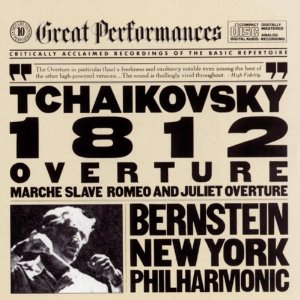Tchaikovsky - 1812 Overture; Marche Slave; Overture-Fantasy (1990)
Tchaikovsky - 1812 Overture; Marche Slave; Overture-Fantasy (1990)

1. 1812 -- Festival Overture, for orchestra in E flat major, Op. 49 2. Slavonic March, for orchestra, Op. 31 3. Romeo and Juliet, fantasy-overture for orchestra in B minor (3 versions) New York Philharmonic Orchestra Leonard Bernstein - conductor (CBS Masterworks – Great Performances 10)
There's no question that Leonard Bernstein loved the music of Peter Tchaikovsky (1840-1893). This is quite apparent in these historic 1957 stereophonic recordings of three very familiar Tchaikovsky masterpieces, made with the New York Philharmonic only a year before Bernstein became the orchestra's music director.
Columbia began stereophonic recording in 1957, the same year that a small label named Audio Fidelity began releasing the first modern stereo LPs; the following year Columbia joined RCA Victor and other major companies in releasing stereo discs.
Taking a page from Mercury's "Living Presence" recording of the "1812 Overture," Columbia also recorded a spectacular high fidelity version of the "potboiler" that Tchaikovsky sometimes detested as just another "noisy" work written for a ceremonial occasion. So, cannons and bells were added to the musical score, following the exact indications in Tchaikovsky's score. It is a fun performance, not to be taken too seriously and simply to be enjoyed.
The "Romeo and Juliet" overture fantasia captures the high points of Shakespeare's tragedy with memorable melodies that are wonderfully played by the New York Philharmonic. All of the emotions are here in a performance that is wonderful because Bernstein captures all of the nuances of Tchaikovsky's score. The famous love theme, often quoted or excerpted, has seldom been played with so much emotion. The "fight" music is played with fierce, almost exhausting intensity, with cymbals clearly representing the clash of swords. The final tragic moments, depicting the death of the the lovers and even the presence of the friar who had married them, are particularly poignant, culminating with the powerful coda with its powerful drum rolls.
"Marche Slave," which actually means "Slavic March," was another ceremonial work, commemorating a minor war in which Russia played a part. Like the "1812 Overture," there are quotes from familiar patriotic songs and even the Russian national anthem. Bernstein's recording may have a few goofs here and there, but the youthful exuberance that he showed in surviving filmed performances from about the same time show that he gave everything he had. There is clearly excitment and joy in the performance. Bernstein even uses the optional repeat in the coda that was often omitted in many other performances of the work.
The youthful Bernstein, who became familiar to millions through his television appearances on "Omnibus" and "Young People's Concerts" on CBS, had an amazing energy when he conducted. He was given to leaping in the air and bold gestures as he inspired the Philharmonic musicians to play with their hearts. There were, of course, those who deplored Bernstein's apparent theatrics, but it's clear that he produced some of the most exciting recordings ever made. This wonderful collaboration would continue regularly until 1969, when Bernstein resigned as music director and only guest conducted the Philharmonic and other orchestras for the rest of his life. ---Robert E. Nylund (Ft. Wayne, Indiana United States)
download: uploaded anonfiles yandex 4shared solidfiles mega mediafire binge filecloudio
Last Updated (Thursday, 05 December 2013 10:15)








